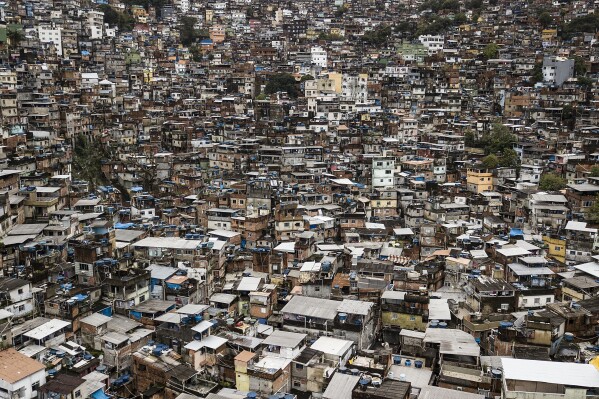[ad_1]
RIO DE JANEIRO (AP) — After decades of delay and pressure, Brazil announced Tuesday it will from now on use “favelas and urban communities” instead of the previous term “abnormal groups” to classify thousands of poor, urban neighborhoods. would use, which was widely viewed. As a stigmatizer.
In the early 1990s, the National Institute of Statistics and Geography, known by its Portuguese acronym IBGE, began to use “abnormal agglomeration” to describe places with irregular occupation and inadequate public services.
The term umbrella includes not only favelas – usually associated with dense, hilly areas in Rio de Janeiro – but also many other terms used throughout Brazil, such as grotto, lowland, stilted house and more. Some, where millions of people live.
The name change, announced in a statement, follows a process of reflection that began in the 2000s, and according to its geography coordinator, Cayo Franco, the IBGE held more than 20 internal meetings and then with a consultation group of external experts. Held many more meetings.
The concept of “abnormality” refers to people’s living conditions, but “many times it is understood as the condition of people themselves,” Franco told The Associated Press in a video call. It was also too vague to represent reality.
Moreover, “aggregation” broadcasts the image of people piled on top of each other, said Theresa Williamson, executive director of the favela advocacy group, Catalytic Communities. Many of these neighborhoods are not recent; Rather, they have been built over generations with individual or collective investment, and despite the state’s chronic negligence in providing sanitation, infrastructure, education and other services.
“When you have a word that’s offensive, labeling such a large part of the country, it can only be counterproductive,” Williamson said. “When you’re talking about such large sectors of society you need words that are more nuanced, particularly ones that you need to be able to adapt to and engage in constructive ways so that you (the government) Instead of denying them, we can improve them. They have no value.”
Rio state legislator Renata Souza, who was born and raised in the city’s most populous Bayside Mare favela, said her doctorate in communication and culture taught her the importance of words, and she celebrated IBGE’s move .
“The word ‘abnormal’ is something that has always appealed to me, because it gives the idea of an deviation, a non-place,” he told the AP over the phone. “Nomenclature is used to reinforce prejudices, discrimination.”
Souza volunteered to survey Marae residents for the IBGE census in 2000.
“It was terrifying for me to work with that word,” he said.
In the process of conducting its next census a decade later, the priority was given to expanding the faulty mapping of historically neglected areas rather than considering problematic name changes, said IBGE’s Franco.
“So it was left for later. But I think there has been a moment of institutional and social maturity, in which there is greater representation of those sectors, residents’ associations and groups who also do research and produce statistics,” he said.
He mentioned the recent creation of a secretariat for the peripheries in the urban ministry of leftist President Luiz Inácio Lula da Silva.
According to preliminary data from the institute’s 2022 census, which was reviewed by the AP early last year, the number of people living in neighborhoods that were then called “atypical groups” has increased by 40% since the 2010 census. It became 16 million.
Franco said the institute has identified more such areas with the help of city officials and civil society groups; Their total population will be included in the 2022 census data and will be released in the second half of this year.
The change in name will not affect historical census data and, as before, IBGE will stop considering areas “favelas and urban communities” once most residents receive legal ownership of properties or all essential services are available.
The term “favela” dates back to the 19th century, when soldiers and former slaves fighting in the Canudos War in northeastern Brazil occupied a hill in Rio, the capital at the time, to pressure the government into keeping its promises. Had taken. Accommodation. The former soldiers named this informal settlement Favela Hill after a highly resilient flowering plant found in the north-east. Today, the neighborhood of the city is known as Providencia.
MLA Souza said that this word underlines the struggle and resilience of the residents.
“This is a plant that grows in the middle of the Brazilian Savanna, and survives without water and in very strong sunlight,” he said. “It is very important that we take this word back.”
“Favela” is widely used in Rio, but not elsewhere in Brazil, so the IBGE sought to add another catch-all term for this category. At a meeting with civil society groups in the capital Brasília last September, the institute proposed adopting “favelas and popular settlements” and, after discussion, changing it to “favelas and popular areas” or “favelas and urban communities”. Was rejected in. ” IBGE ultimately chose the latter option.
“We had some ups and downs, but it was positive. It would be positive for IBGE and Brazilian society that we made this change, Franco said. “It better represents what we want to map and better represents what people should understand from the data.”
[ad_2]
Source link
